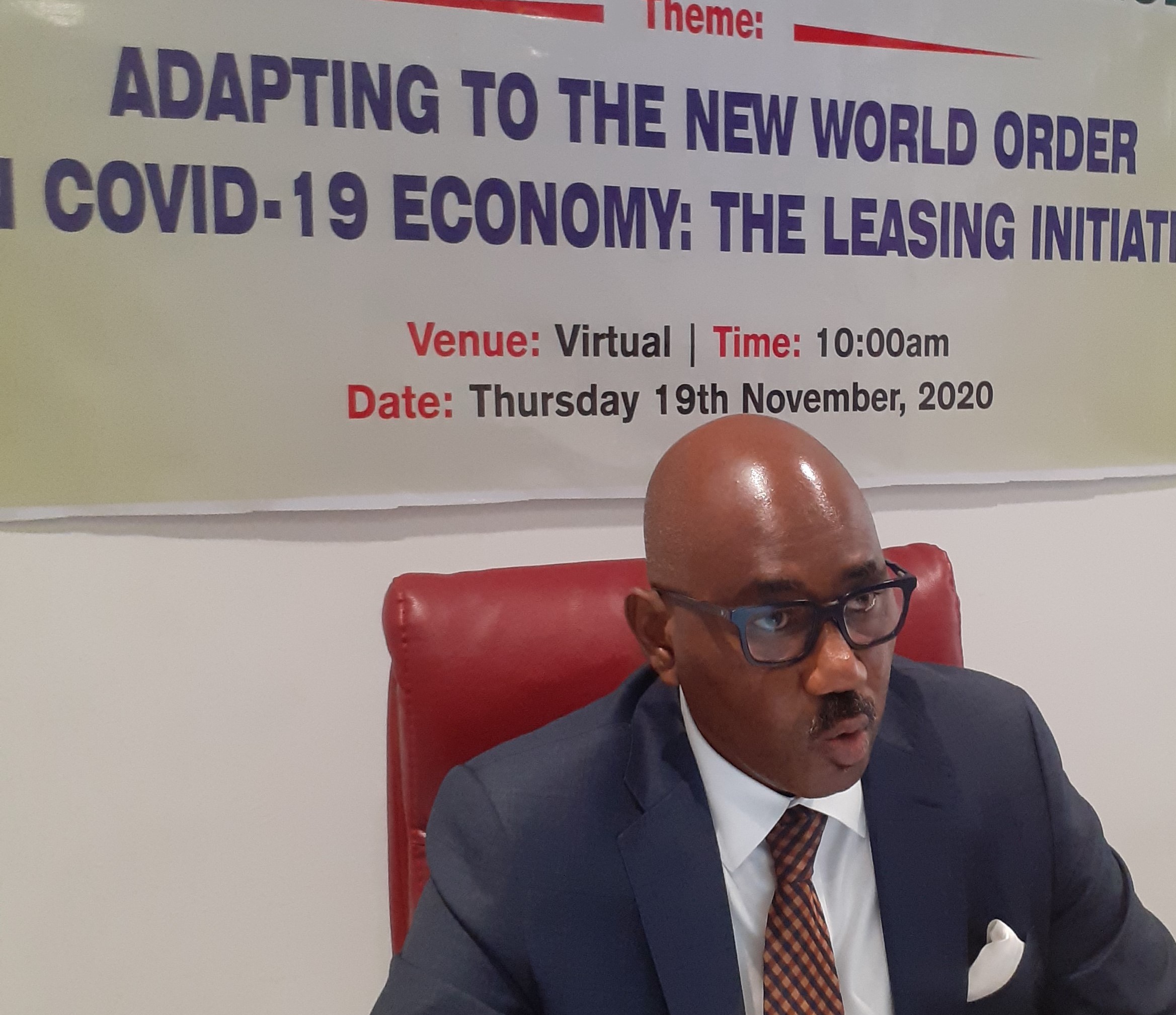
The Special Guests of Honour, Otunba Richard Adeniyi Adebayo, CON, Honourable Minister of Industry, Trade and Investment and Arc. Olamilekan Adegbite, Honourable Minister of Mines and Steel Development.
Esteemed Guest Speakers and Panellists
Distinguished Special Guests
Directors of ELAN
Past Chairmen and other past Directors of ELAN
Members of ELAN
Gentlemen of the Press
Ladies and Gentlemen,
It is a great pleasure to welcome you, on behalf of the Equipment Leasing Association of Nigeria (ELAN), to the 18th Annual National Lease Conference organised by the Association.
I am especially honoured to welcome the Special Guests of Honour Otunba Richard Adeniyi Adebayo, CON, Honourable Minister of Industry, Trade and Investment and Arc. Olamilekan Adegbite, Honourable Minister of Mines and Steel Development, esteemed Guest Speakers/Panellists and other dignitaries. We are most delighted to have Rafael Castillo one of our Guest Speakers who joins us from the United States of America, Riadh Naouar, of the International Finance Corporation (IFC), a Guest Panellist, joining from Morocco and other special guests from across the globe . We express our sincere gratitude to you all for creating time to honour our invitation in spite of your very busy schedules.
The Annual National Lease Conference, is the biggest gathering of stakeholders in the Nigerian leasing industry. Since 2003, when the first edition was held, the conference has grown over the years to become a veritable platform for propagating the ideals of leasing and cross fertilisation of ideas to propel the development of the leasing industry and the national economy.
The 18th National Lease Conference is coming at a very interesting time – the Covid 19 pandemic being witnessed globally, which has become more challenging for Nigeria as a nation. This situation, is exacerbated by the #ENDSARS protest across the country that led to loss of lives and properties. It is therefore not surprising that this year’s event, with the theme “Adapting to the New World Order in Covid 19 Economy – The Leasing Initiative, is focusing on this development, considering strategy and solution models that would be needed to enable the leasing industry forge ahead in this new direction and enhance its value proposition to the economy.
Indeed, the Covid 19 pandemic poses huge socio-economic Challenges. At the height of the virulent disease, over two third of the world’ economy was on lock down for several weeks, forcing the global economy to the cliff to the extent that many businesses were pushed into bankruptcy and Countries entering into forced recession. This prompted fiscal and monetary authorities to churn out various stimulus packages to ameliorate its effects on the public and private sectors operators. Of course, the scenario which has largely altered global economic predictions, has equally taken many back to the drawing board, while rush to take all sorts of revival loans from multilateral financial institutions, has become the dominating feature of the unending period.
As the dust appears to be settling, the second wave of the pandemic has set in with many developed economies adopting new restrictions to curb the spread. There is however hope on the horizon with the recent discoveries of vaccines. This notwithstanding, the consequential effect of the pandemic is expected to linger on for the next few years
With the global economy reeling under covid-19 attack, the Nigerian economy which was on the slippery slope of recovery, was not spared. The situation is deteriorating as every day brings fresh challenges, leaving shocks in the system on solutions. For a largely import-dependent economy, the unprecedented fall in price of oil in the international market due to low demand, further exerted pressure on the economy. Government revenues were weakened substantially, driving increase in debt profile and service ratio. Also, this might have contributed to the recent adjustment of the official exchange rate of Naira to N380 to $1 from N360 to $1, in furtherance of the exchange rates unification. The development however, exposes Nigeria to spikes in risk aversion in the global capital market with the possibility of putting more pressure on forex market, as foreign portfolio investors exit the Nigerian market.
As it is, Nigeria currently stands the risk of sliding into another recession with a contracting Gross Domestic Product (GDP) of -6.1 percent for second quarter (Q2) of 2020) and the possibility of a negative growth in (Q3 2020). However, the Federal and State Governments have taken several palliative measures to reduce its impacts on the people and businesses. The Federal Government for instance, developed the Nigeria Economic Sustainability Plan (NESP) involving a stimulus package of N2.3trillion in response to the health and economic emergencies. Under the plan, the key projects focusing on mass agriculture, public works and road construction, support for MSMES and digital technology etc., are expected to sustain economic activity, boost production, create jobs and save foreign exchange.
Also, as part of the stimulus package, the Central Bank of Nigeria (CBN), equally announced the intention to provide N1trillion in loans to boost local production and manufacturing across critical sectors; one-year extension of moratorium on principal repayment on CBN intervention facilities, reduction on interest and intervention loans from 9% to 5%. The package also includes N50 billion targeted credit facilities for households and Small and Medium Enterprises (SMEs), N100 billion Healthcare loans to pharmaceutical companies, healthcare practitioners to expand capacity
Indeed, the leasing industry is not insulated from the impact of the pandemic as it affects business volume and operations. While it is hard to accurately capture the impact due to uncertainties, there are certain headwinds that are becoming glaring. These include, delayed rental payment due to slow business activities; increased cost of assets and operations resulting from recent “adjustment” of the Naira, demand shift to more productive and essential assets etc.
However, in the midst of the disruption, it is imperative for the leasing industry to remain resilient to navigate through the storm. This calls for realignment of strategies and adoption of innovative approach. Specifically, it would require lease practitioners for instance, to build strategic alliance within and outside the industry to enhance capacity; strengthen internal capacity to improve processes and performance; be more creative and innovative – developing appropriate strategy to stay afloat, staying close to customers, while adopting a win – win approach in addressing the challenges. Also, to concentrate on areas where they can impact and control, while identifying new opportunities.
The challenges of the leasing industry notwithstanding, it has always proven to be strong and growing in emerging as well as developed markets through all stages of an economic cycle, contributing effectively to capital formation in the economy. The leasing industry continues to deepen its penetration in the equipment finance market, delivering multiplicity of benefits to customers and meeting the world’s equipment needs. Globally, an estimated total annual lease volume of $1.5 trillion is generated, accounting for 20% of total investment in equipment, contributing about 1.5% to GDP.
The Nigerian leasing industry remains an essential contributor to national economic development and continues to demonstrate innovation and flexibility in the face of economic turbulence. The industry maintained its growth trajectory – recording more than a decade of uninterrupted growth. Available statistics show that new business volume grew by 13.5 percent in 2019, rising from outstanding lease volume of N1.68trillion in 2018 to N1.91trillion in 2019. This growth is a testament to the attraction of leasing and its market potential, facilitated by enhanced lease awareness, increasing demand for leasing services – necessitated by the rising cost of assets and stimulation of domestic production; increased investment and participants as well as relative stability in the macroeconomic environment.
The appeal of leasing is underscored in its developmental attributes, allowing easy and convenient access to much needed productive assets. In today’s reality, the developmental attributes of leasing can be brought to bear on efforts to stimulate the economy and get it out of the woods. For instance, leasing can facilitate the actualisation of key project initiatives of the Nigeria Economic Sustainability Plan (NESP) other intervention programmes and the overall economic agenda of Government. Specifically, for Government to achieve the desired deliverables in its priority areas of agriculture, infrastructure, manufacturing, mining etc, massive investment in capital assets is required and with the paucity of funds, this task appears daunting. There is therefore the need for Government to adopt a proactive and innovative approach to attract the necessary investment. Equipment leasing is a major tool that can be adopted in this regard.
We therefore encourage Governments at all levels to utilise leasing in driving their developmental agenda. We continue to express the willingness of the leasing industry to work with the Government and critical Agencies like the solid Mineral Development Fund (SMDF), to stimulate capital formation in the economy. This will involve effective engagement with stakeholders to develop and implement plan that will bring the necessary integral support in order to deepen leasing penetration and contribution to economic activities in Nigeria.
It is also imperative for businesses to consider the leasing route. As they strive to overcome the disruptions and learn to live the new normal, they will be needing capital assets. Businesses will arguably find it much easier to connect their payment obligations to their own revenues, so as to have minimum stress and maximum focus on operations
While the role of leasing is obvious, the continued support of stakeholders is important for the industry to fully realise its potential. A key consideration at this moment, is the full implementation of the Equipment Leasing Act (2015), a significant Law aimed at bringing certainty, sanity and promote investment in the leasing industry. The Act established the Equipment Leasing Registration Authority which is expected to give effect to the intent and purport of the Act. ELAN has been engaging the Ministry of Finance, Budget and National planning, the supervisory Ministry for the formal inauguration of the body to get it operational. The full implementation of this law is very instrumental to growth of leasing and the Nigerian economy. For instance, the international investing community has been waiting in the wings to cash-in on the legal framework and opportunities in the leasing industry. It is therefore important that this process is completed without further delay.
Distinguished Ladies and Gentlemen, I have no doubt that with the experienced Speakers, Panelists and quality of participation, this conference will come out with proactive deliverables and set the stage for further engagement that would facilitate effective contribution of the various stakeholders to national economic development.
Before ending this address, permit me to invite non-members present here to join ELAN. The Association since its establishment in 1983, has been at the vanguard of activities aimed at promoting leasing in Nigeria to the benefit of members and other stakeholders. Let us come together to sustain and grow the leasing industry that would contribute more to economic development and meet the diverse corporate and individual objectives.
Finally, on behalf of ELAN, welcome once again to the 18th National Lease Conference and I wish us a fruitful session.
Thank you.
OLUTOYIN OKEOWO
CHAIRMAN, BOARD OF DIRECTORS, ELAN

